Coordinación
Una coordinación sólida puede evitar vacíos y duplicaciones en las respuestas humanitarias, así como garantizar que los PTM complementen otros tipos de asistencia. Sin embargo, el informe del «Estado Global de los Programas de Transferencias Monetarias» de la CALP Network muestra que la coordinación de la asistencia en efectivo es vista como débil y ad hoc, y que esto está teniendo graves repercusiones operativas.
Los donantes, las ONG y los líderes de los grupos de trabajo de transferencias monetarias (GTM) han pedido claridad sobre tres temas principales relacionados con la coordinación de la asistencia en efectivo:
- Quién debe ser responsable de asegurar una coordinación eficaz de la asistencia en efectivo;
- Cuál es la función y el mandato de los grupos de trabajo de transferencias monetarias, incluso en relación con las transferencias monetarias multipropósito;
- Cómo se debe dotar de recursos a la coordinación de asistencia en efectivo.
Tenemos que basarnos urgentemente en lo que funciona y proporcionar claridad a nivel mundial sobre las preguntas arriba mencionadas, adaptándonos a los diferentes contextos. Hace mucho tiempo que se deberían haber tomado decisiones claras basadas en necesidades operativas y no en la política de las agencias.
Prioridades actuales
El objetivo de la CALP Network es contribuir a seguir progresando en este tema en tres niveles: apoyar a los grupos de trabajo de transferencias monetarias a nivel regional; contribuir a soluciones prácticas para la coordinación de la asistencia en efectivo a nivel mundial; y convocar una discusión basada en la evidencia sobre temas clave, destacando puntos de decisión críticos y oportunidades de progreso.
Contenido destacado

Cash Coordination Tip Sheet
Guidelines and Tools
This tip sheet sets out established best practice, key guidance and resources for all aspects of cash coordination, intended as a clear, accessible and action-oriented guide for those engaged in coordination of cash and voucher assistance (CVA) at the field level.

Introducing the Cash Coordination Tip Sheet
Webinar
The CALP Network has developed a tipsheet setting out established best practice and key guidance and resources for all aspects of cash coordination, intended as a clear, accessible and action-oriented guide for those engaged in coordination of cash and voucher assistance at the field level.

Cash Coordination: A proposal from members in MENA
Blog Post
Earlier this year the CALP Network undertook regional consultations to explore options for cash coordination. This blog lays out recommendations from participants from the Middle East and North Africa who sketched out what cash coordination, and coordination more broadly, could look like in future to support a more effective, efficient and accountable response.
Últimos recursos

Presentation for the CALP Network’s webinar on remote registration and verification in the COVID-19 response
Presentation
Watch the webinar recording here Speaker presentations from the CALP Network’s 14 July 2020 webinar on: Peril or pitfalls?: Emerging practices on remote registration and verification in the COVID-19 response Remote CVA programming has been highlighted as a key challenge for the community of practice in...

Identifying practical options for linking humanitarian assistance and social protection in the COVID-19 response
Guidelines and Tools
This short note examines the relationship between humanitarian assistance and social protection in response to COVID-19. Whilst a variety of guidance is being developed to support humanitarian practitioners around the response to the pandemic, less material exists that guides humanitarian practitioners on...

Emerging practices of remote registration and verification
Webinar
Watch the webinar recording here Presentation available here Remote CVA programming has been highlighted as a key challenge for the community of practice in scaling up CVA to mitigate and address the widespread economic impacts of COVID-19. Targeting, registering and verifying new recipients as...
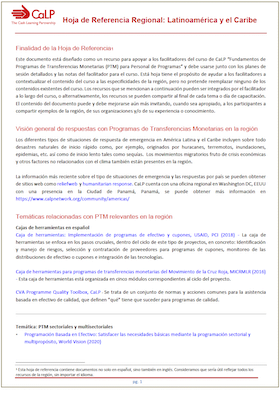
Hoja de Referencia Regional: Latinoamérica y el Caribe
Guía y herramientas
Este documento está diseñado como un recurso para apoyar a los facilitadores del curso de CALP Network “Fundamentos de Programas de Transferencias Monetarias (PTM) para Personal de Programas” y debe usarse junto con los planes de sesión detallados y las notas del facilitador para el curso. Está...

Review and analysis of identification and registration systems in protracted and recurrent crises
Report
This report presents findings from a study regarding Management and Information Systems (MIS) used to identify and register target populations in cash transfer and social protection programming. The research was conducted by DAI and Caribou Digital, and commissioned through DFID’s BASIC programme. The...

Currency in Crisis: Ways forward for GOAL Cash and Voucher Assistance in North-West Syria
Report
Currency depreciation and price inflation are two of the main factors that influence Cash and Voucher Assistance (CVA) programming in North-West Syria. Between August 2019 and July 2020, the Syrian Pound (SYP) has dropped 161% against the US Dollar (USD), and the current trend of rapid depreciation in the...

Cash and Voucher Assistance – COVID-19 Toolkit – One pager
Guidelines and Tools
Cash and Voucher Assistance (CVA) Toolkit (with hyperlinks) provides an overview on Plan International’s key technical resources developed around the COVID-19 response.
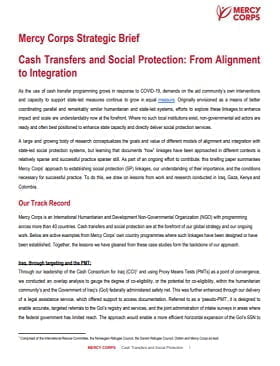
Cash Transfers and Social Protection: From Alignment to Integration
Policy paper
As the use of cash transfer programming grows in response to COVID-19, demands on the aid community’s own interventions and capacity to support state-led measures continue to grow in equal measure. Originally envisioned as a means of better coordinating parallel and remarkably similar humanitarian and...

Ep. 3. What does the future of financial assistance mean for your work today?
Podcast
In this episode of the CashCast we speak to Meg Sattler from Ground Truth Solutions, Lars Peter Nissen from ACAPS, and Jenny Caswell from GSMA about the changes we should be seeing today, to effectively meet the humanitarian needs of the future.

Water, Markets, Cash and Drought Resilience in Somaliland
Report
This learning brief looks Cash to Access Water (CAW) in Somaliland. Water markets exist, and they exist everywhere. In Somaliland, these markets are the ‘first responders’ to critical water needs during severe dry seasons and droughts. For decades, humanitarian agencies have been focusing on the use...
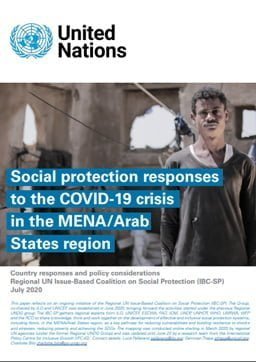
Social Protection Responses to the COVID-19 Crisis in the MENA/ Arab States Region
Policy paper
This paper reflects on an ongoing initiative of the Regional UN Issue-Based Coalition on Social Protection (IBC-SP). The Group, co-chaired by ILO and UNICEF, was established in June 2020, bringing forward the activities started under the previous Regional UNDG group. The IBC-SP gathers regional experts...
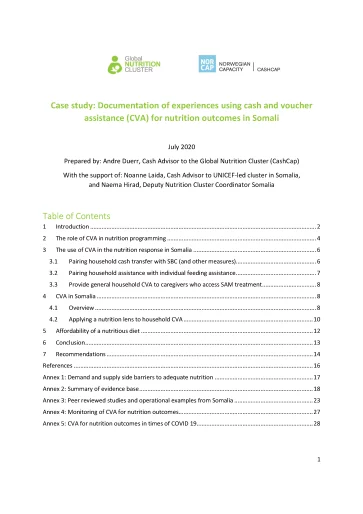
Case Study: Documentation of experiences using cash and voucher assistance (CVA) for nutrition outcomes in Somali
Case Study
This case study was conducted as part of the wider initiative to develop guidance on the use of cash and voucher assistance (CVA) for nutrition outcomes. The case study reflects experiences and lessons learned in the context of Somalia. It further explores opportunities to apply a stronger nutrition lens...
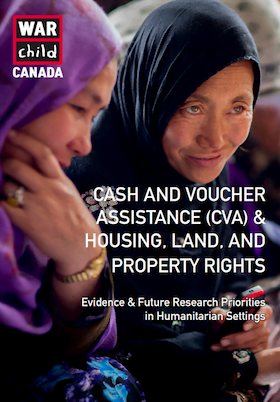
Cash and Voucher Assistance (CVA) & Housing, Land, and Property Rights
Report
The right to adequate housing has been recognized as an essential component to an adequate standard of living.1 The centrality of the right to adequate housing, which encompasses concepts such as security of tenure, affordability and habitability, are intimately related to livelihood building.2...

Currency in Crisis: Ways forward for GOAL Cash and Voucher Assistance in North-West Syria
Report
FULL STUDY VERSION Currency depreciation and price inflation are two of the main factors that influence Cash and Voucher Assistance (CVA) programming in North-West Syria. Between August 2019 and July 2020, the Syrian Pound (SYP) has dropped 161% against the US Dollar (USD), and the current trend of rapid...
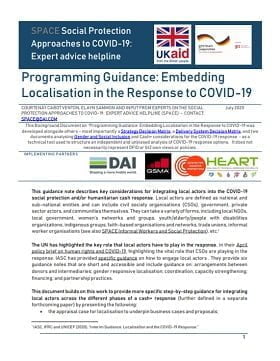
Programming Guidance: Embedding Localisation in the Response to COVID-19
Guidelines and Tools
This guidance note describes key considerations for integrating local actors into the COVID-19 social protection and/or humanitarian cash response. Local actors are defined as national and sub-national entities and can include civil society organisations (CSOs), government, private sector actors, and...

Cash Crash: Syria’s economic collapse and the fragmentation of the state
Report
The Syrian economy is currently witnessing unprecedented volatility. To date, analysts have predominantly focused on the impact this crash has had on Syrian households, which are now facing acute financial pressure as poverty rates climb toward 90 percent, food insecurity skyrockets, and famine becomes an...
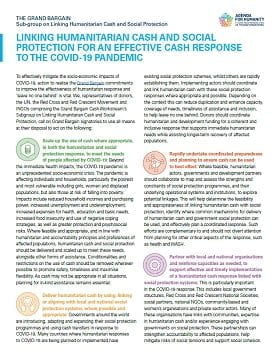
Linking Humanitarian Cash and Social Protection for an Effective Cash Response to the Covid-19 Pandemic
Report
The Grand-Bargain (GB) Sub-group on Linking Humanitarian Cash and Social Protection issues a 1-pager calling on all GB signatories to use all means at their disposal to deliver on their commitment to link humanitarian cash and social protection where appropriate for an effective cash response to the...
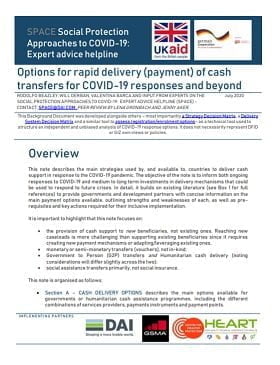
SPACE – Options for rapid delivery (payment) of cash transfers for COVID-19 responses and beyond
Guidelines and Tools
This note describes the main strategies used by, and available to, countries to deliver cash support in response to the COVID-19 pandemic. The objective of the note is to inform both ongoing responses to COVID-19 and medium to long term investments in delivery mechanisms that could be used to respond to...

Cash and Voucher Assistance Case Studies – Yemen and Afghanistan
Report
Evidence and feasibility of cash and voucher assistance (CVA) for sexual and reproductive health services in humanitarian emergencies. There is limited evidence about the effectiveness and feasibility of CVA, and about its overall effect on SRHR outcomes, particularly in humanitarian settings. Therefore,...
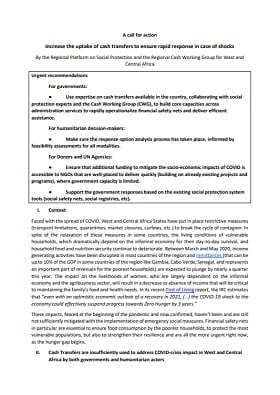
A Call for Action: Increase the Uptake of Cash Transfers to Ensure Rapid Response in case of Shocks
Guidelines and Tools
Despite a growing global interest in cash and voucher assistance since the beginning of the pandemic, the modality is still insufficiently used to limit the socio-economic impacts of the COVID-19 crisis in West and Central Africa, both by governments and humanitarian actors. This call to action, developed...